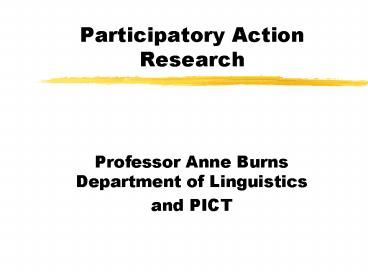Participatory Action Research - PowerPoint PPT Presentation
1 / 16
Title:
Participatory Action Research
Description:
Action research is simply a form of self-reflective enquiry undertaken by ... interpretive/hermeneutic - 'to empathise and understand' critical - 'to change' ... – PowerPoint PPT presentation
Number of Views:1913
Avg rating:5.0/5.0
Title: Participatory Action Research
1
Participatory Action Research
- Professor Anne Burns Department of Linguistics
- and PICT
2
What is action research?
- What does action research mean?
- How is it carried out?
- What kind of research is it?
- How can it be used in this project?
3
Some definitions
- Action research is simply a form of
self-reflective enquiry undertaken by
participants in social situations in order to
improve the rationality and justice of their own
practices, their understanding of these practices
and the situations in which the practices are
carried out. - (Carr Kemmis, 1986, p. 162)
4
Some definitions
- AR involves a self-reflective, systematic and
critical approach to enquiry by participants who
are at the same time members of the research
community. The aim is to identify problematic
situations or issues considered by participants
to be worthy of investigation in order to bfing
aboout critically informed changes in practice.
Action research is underpinned by democratic
principles in that the ownership of change is
invested in those who conduct the research. - (Burns, cited in Cornwell, 1999)
5
Aims of PAR
- PAR has a double objective. One aim is to
produce knowledge and action directly useful to a
group of people - through research, adult
education and sociopolitical action. The second
aim is to empower people at a second and deeper
level through the process of constructing and
using their own knowledge
(Reason, 1998, p.
271)
6
Characteristics of action research
- focus on a particular social situation
- collaboration/dialogue with others to identify
the issues and to collect and analyse data - deliberate intervention into the operation of the
status quo - processes of research lead to the construction of
knowledge and theory (and political action)
7
Characteristics of action research
- testing of knowledge and theory by feeding them
back into changes in practice - evaluation of changes through further cycles of
action and reflection - opening of theories and knowledge to wider
scrutiny through publication, information
dissemination, and application by others in their
own situations
8
Processes of Action Research
- Plan - develop a plan of critically informed
action to improve what is already happening - Act - act to implement the plan
- Observe - observe the effects of the critically
informed action in the context in which it occurs - Reflect - reflect on these effects as the basis
for further planning, subsequent critically
informed action, etc. through a succession of
stages.
(Kemmis McTaggart, 1988, p.
10)
9
(No Transcript)
10
(No Transcript)
11
Processes of Action Research
- Exploring
- Identifying
- Planning
- Collecting data
- Analysing/reflecting
- Hypothesising/speculating
- Intervening
- Observing
- Reporting
- Writing
- Presenting
- (Burns, 1999, p. 35)
12
AR - what kind of research is it?
- Research paradigms determine whether research
assists in the maintenance of the status quo in
society or helps to transform the dominant social
paradigm. As a result it is important to examine
the practices and politics of the different
research paradigms the positivist, the
interpretivist and critical and
poststructuralist paradigms (Fien Hillcoat,
1996, p. 26)
13
Paradigms of research
- positivist/post-positivist - to describe,
control and predict - interpretive/hermeneutic - to empathise and
understand - critical - to change
- poststructuralist - to deconstruct
(Lather, 1992)
14
Action research and critical theory
- Central concepts are
- the empowerment of participants in the social
situation - confrontation of inequities/ in the system
- transformation of the social situation
- movement towards a better world
- self-conscious criticism through awareness of
ideological and epistemological assumptions that
shape the social situation - enhanced awareness of participants own
subjective, intersubjective and normative frames
of reference
15
Undertaking action research
- Key issues
- Who will you involve?
- What issues/questions will you focus on?
- What steps in the process will you put in place
next? - How will you collect data/information?
- How will you track/analyse it/identify emerging
issues? - What resources do you need?
- What skills/knowledge do you need?
16
References
- Burns, A. (1999). Collaborative action research
for English language teachers. Cambridge
Cambridge University Press. - Carr, W Kemmis, S. (1986). Becoming critical
Knowing through action research. Geelong, Vic
Deakin University. - Cornwell, S. (1999). An interview with Anne Burns
and Graham Crookes. The Language Teacher, 23
(12), 7-9. - Lather, P. (1992). Critical frames in educational
research Feminist and Post-Structural
Perspectives. Qualitative Issues in Educational
Research, 31 (2), 87-9. - Fien, J. Hillcoat, J. (1996). The critical
tradition in research in geographical and
environmental educational research. In M.
Williams (Ed.), Understanding geographical and
environmental education. London Cassell. - Reason, P. (1998). Three approaches to
participative inquiry. In N.K. Denzin Y.S.
Lincoln (Eds.), Strategies of qualitative
research. London Sage.

